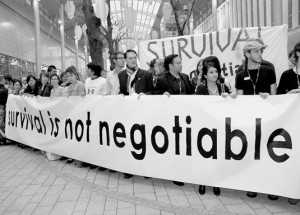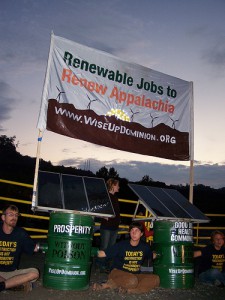Have you taken the Climate Pledge of Resistance? I did.
Last summer, the Yes Men launched www.beyondtalk.net calling on thousands to sign up and put their freedom on the line by committing civil disobedience to save the climate. Now, a coalition of social, environmental, faith-based, indigenous and climate groups have taken beyondtalk one step further and created the “Climate Pledge of Resistance.”

Inspired by the 1980’s Pledge of Resistance solidarity movement against U.S. intervention in Central America, climate groups are moving “beyond talk” and organizing active resistance against climate chaos and climate injustice.
In the 1980’s various faith and peace groups coordinated hundreds of affinity groups around the nation to prevent U.S. sponsored death and destruction in Central America. The Climate Pledge of Resistance will be creating a similar infrastructure of non-violent direct action and climate justice to challenge governments and corporations complicit in destroying the climate and harming those communities most impacted by climate change.
This year, we’ve already seen mass anti-coal actions in Washington D.C. and Charlotte, NC, ongoing direct actions in southern West Virginia against the mining industry and mass action at Chevron’s Richmond California refinery.
In the coming weeks and months, resistance to corporate sponsored climate change will grow and spread. This weekend, two climate convergences will happen in Richmond, CA and in Pittsburgh, PA. Next week climate activists will march and take action at the G20 in Pittsburgh. On Oct 24 will be a global day of action against climate change and on Nov. 30 there will be another day of action against climage change, both leading into the Copenhagen talks in early Dec. [where mass action is expected].
Now is the time to step up our actions and move beyond talk. On Tuesday, activists in the U.S. and Canada risked livelihood and liberty to stop carbon intensive tarsands projects. Everywhere I turn on my computer I hear about new actions in Appalachia to stop King Coal’s deadly advance. We need more and more people to join these efforts. We need people to take the Climate Pledge of Resistance and begin organizing actions to save the climate in your community.

Get involved
Check the press release here.
For More Information Contact:
Celia Alario, +1.310.721.6517
Kim Marks, Rising Tide North America, +1.503.539.7471
Andy Bichlbaum, The Yes Men, +1.718.208.0684
Tom Goldtooth , Indigenous Environmental Network, +1.218.760.0442
Thousands Called to Risk Arrest To Fight Climate Chaos
Climate ‘Pledge of Resistance’ Effort Spurs Tradition of Nonviolent Civil Disobedience in the USANationwide~A Climate Pledge of Resistance http://beyondtalk.net/ pledge/ (CPR For the Planet) has been initiated by social, environmental, faith-based, indigenous and climate groups [1] to move beyond talk by organizing the largest civil disobedience campaign in the history of the struggle to stop climate change.
The Climate Pledge of Resistance/CPR For the Planet was inspired by the 1980s Pledge of Resistance [2] solidarity movement against U.S.
involvement and support for wars in Central America. That Pledge emerged with a very effective national campaign whose structure supported autonomous grassroots nonviolent direct action and rooted itself in direct democracy.Sharon Lungo of the Ruckus Society http://www.ruckus.org/ said:
“Climate chaos is real and people are obligated to come forward and help resuscitate our planet from the on-going damage that is being done. The Pledge realizes that no social justice movement in history has been successful without the strategic use of nonviolent direct action. There comes a moment in every struggle when the power of everyday people needs to be felt, and when the community understands that it can only attain victory by advancing their front line. That moment is now.”Lungo also points to a recent example of the effectiveness of nonviolent action: “This Call for CPR For the Planet comes on the heels of the Environmental Protection Agency’s decision last week to put a moratorium on Mountain Top Removal [3], following a massive campaign of non-violent civil disobedience. Non-violent direct action works.”
“Not only are the extraction and combustion of fossil fuels killing our sacred Mother Earth, it’s peoples and all living things, fossil fuels development is a human rights and environmental justice issue disproportionately affecting Indigenous Peoples and cultures here in North America and around the world,” stated Tom Goldtooth, Executive Director of the Indigenous Environmental Network http://www.ienearth.org/
Goldtooth continued: “People and most especially governmental
leaders of the industrialized countries of the North must take responsibility and take action now to quickly make a transition away from a fossil fuel economy and demand real solutions to climate change.”“Climate policy arenas (in DC or Copenhagen) will not deliver any durable solutions unless community-based, actions-led strategies can neutralize the power of big oil and their buddies,” said Ananda Lee Tan of Rising Tide North America http:// www.risingtidenorthamerica.org/. Tan is mobilizing support for community-led campaigns to end the Chevron Oil company’s climate pollution in Richmond, CA and around the world
Tan concludes, “In order to save people and planet, we need to confront the biggest corporate polluters with direct action in our own backyards.”
The Call also comes one week before the International Coal Conference and the G-20, both meeting in Pittsburgh, PA. So far that city is planning for a virtual lock-down, even calling in 2,000 combat ready National Guard troops, plus thousands of other law enforcement personal. The city is not allowing the Three Rivers Climate Convergence to assemble and camp, escalating the need for activists to commit civil disobedience in defense of the planet.
Nonviolent direct actions are planned which will call upon the Senate to pass legislation that will adequately address the climate crisis.
(4) Such actions will build toward and culminate in full implementation of the Climate Pledge of Resistance on November 30, 2009. This is one week before the United Nations Climate Conference begins in Copenhagen, Denmark where negotiators will attempt to find agreement on a climate treaty to succeed the expiring Kyoto document.
The Pledge states that, “Sadly, if these leaders reached an agreement today, it wouldn’t be strong enough to do much good.”Civil disobedience has a long history at home and abroad. It was only the uncompromising action of hundreds of thousands that ended U.S.
segregation and South African apartheid.“Non-violent civil disobedience has been at the forefront of almost every successful campaign for change. Especially in America, and especially today, we need to push our leaders hard to stand up to industry lobbyists and make the sorts of changes we need,? said Andy Bichlbaum of The Yes Men. “Roosevelt would never have been able to push through the New Deal if people hadn’t taken to the streets, occupied factories, and demanded it. The election of Obama is still a huge opportunity – but only if we give him the pressure he needs to be who we elected him to be,” he added.
###NOTES TO EDITORS:
[1] The initiators of the Pledge are
350.org http://www.350.org/ ,
Alliance of Community Trainers http://trainersalliance.org/ ,
Center for the Working Poor http://centerfortheworkingpoor.org/ ,
Global Justice Ecology Projecthttp://www.globaljusticeecology.org/ , Indigenous Environmental Network http://www.ienearth.org/ , Mobilization for Climate Justice West
Rainforest Action Network http://www.ran.org/ ,
Rising Tide North America http://www.risingtidenorthamerica.org/ , Ruckus Society http://www.ruckus.org/
Yes Men[2] During the 1980s a solidarity movement against the US involvement and support for wars in Central America emerged with a very effective national campaign whose structure supported autonomous grassroots nonviolent direct action and rooted itself in direct democracy. The campaign was for people to publicly commit to engage in acts of legal protest or nonviolent civil disobedience to prevent a US invasion of Nicaragua or more significant escalation in Central America. It was believed that if enough people publicly announced their intent it would be a powerful deterrent.
Mainstream groups like the American Friends Service Committee and the United Methodist Church were key partners along with solidarity networks, policy organizations and anti-intervention groups. By 1985, 50,000 had signed the pledge. By 1987 over 100,000 had signed. The network lasted for years and in all likelihood prevented an invasion of Nicaragua.
The Pledge Campaign had a unique structure that used a people-powered strategy to prevent war. By rooting the work at the local level, organizations, individuals and groups of friends formed affinity groups, spokes councils and coordinating committees that would engage in local campaigns. These local pledge groups formed regional councils for action coordination. The whole network was supported by a national clearing house that provided information, resources, media work and coordination of national calls to action.
[3] Mountaintop removal / valley fill coal mining (MTR) has been called strip mining on steroids. One author says the process should be more accurately named: mountain range removal. Mountaintop removal / valley fill mining annihilates ecosystems, transforming some of the most biologically diverse temperate forests in the world into biologically barren moonscapes. For further information see http://www.mountainjusticesummer.org/facts/steps.php
4] Over 300 organizations have signed a statement saying that the climate bill passed in the House has been seriously weakened by “polluter giveaways” and will not adequately slow down the emission of greenhouse gases.